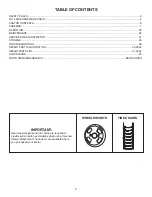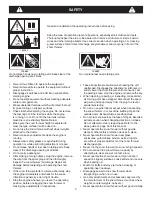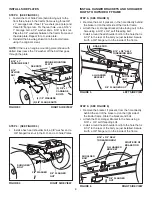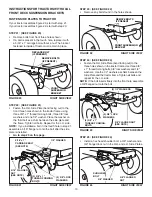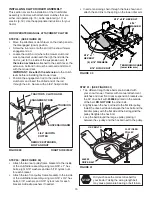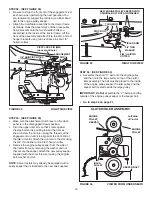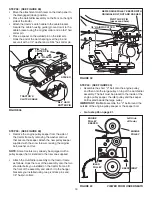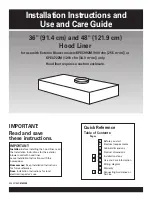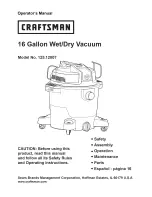
3
SAFETY
Read and understand the operating instructions before using.
Keep the area of operation clear of all persons, especially small children and pets.
Thoroughly inspect the area to be cleared and remove all door mats, sleds, boards,
wires and other foreign objects. Use extreme caution when operating on or crossing
gravel surfaces. Never direct discharge at bystanders or allow anyone in front of the
snow thrower.
Do not place hands near rotating parts. Keep clear of the
discharge opening at all times.
Do not place feet near rotating parts.
• Never allow children to operate the equipment.
• Never allow adults to operate the equipment without
proper instruction.
• Disengage all clutches and shift into neutral before
starting engine.
• Do not operate equipment without wearing adequate
winter outer garments.
• Wear substantial footwear which will protect feet and
improve footing on slippery surfaces.
• Check fuel before starting the engine. Do not remove
the fuel cap or fill the fuel tank while the engine
is running or hot. Do not fill the fuel tank indoors.
Gasoline is an extremely flammable fuel.
• Make sure the snow thrower height is adjusted to
clear the type surface it will be used on.
• Do not use the snow thrower without wheel weights
attached to the tractor.
• Never make any adjustments while the engine is
running.
• Always wear safety glasses or eye shield during
operation or while performing adjustment or repair.
• Do not place hands or feet near rotating parts. Keep
clear of the discharge opening at all times.
• Do not carry passengers.
• After striking a foreign object, stop the engine, remove
the wire from the spark plug and then thoroughly
inspect the snow thrower for damage. Repair any
damage before restarting and operating the snow
thrower.
• If the snow thrower starts to vibrate abnormally, stop
the engine immediately and check for the cause.
Vibration is generally a warning of trouble.
• Stop the engine whenever you leave the operating
position, before unclogging the snow thrower or
making any adjustments or inspections.
• Take all possible precautions when leaving the unit
unattended. Disengage the attachment clutch lever or
switch, lower the snow thrower, shift into neutral, set
the parking brake, stop the engine and remove the key.
• When cleaning, repairing or inspecting, make certain
all moving parts have stopped. Disconnect the spark
plug wire and keep it away from the plug to prevent
accidental starting.
• Do not run engine indoors except when transporting
the snow thrower in or out of the building. Open the
outside doors. Exhaust fumes are dangerous.
• Do not clear snow across the face of slopes. Exercise
extreme caution when changing direction on slopes.
Do not attempt to clear steep slopes. Refer to the
slope guide on page 35 of this manual.
• Never operate the snow thrower without guards,
plates or other safety protection devices in place.
• Never operate the snow thrower near glass
enclosures, automobiles, window wells, drop offs
etc. without proper adjustment of the snow thrower
discharge angle.
• Never run the snow thrower into snow at high speeds.
• Do not overload the snow thrower capacity by
attempting to clear snow at too fast a rate.
• Never operate the snow thrower at high transport
speed on slippery surfaces. Look behind and use care
when backing up.
• Watch for traffic and stay alert when crossing or
operating near roadways.
• Disengage power to the snow thrower when
transporting or when not in use.
• Use only attachments and accessories approved by
the manufacturer of the snow thrower (such as wheel
weights, counter weights, cabs etc.)
• Never operate the snow thrower without good visibility.
184045
199683
199682
Содержание LST42E
Страница 29: ...29 NOTES...


